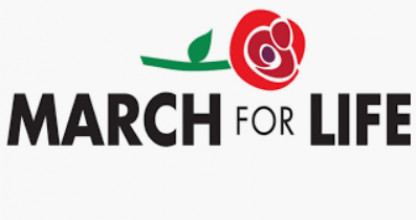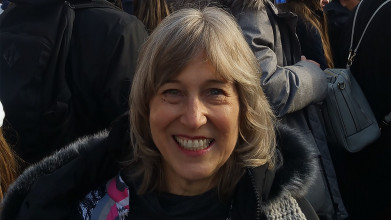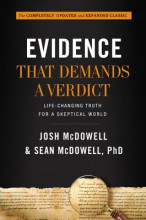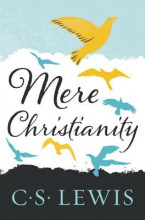Excerpt:
Dr. Kathi Aultman: The abortionist thinking is so intense…
Jim Daly: Right.
Kathi: … that, scientifically, we know that life begins at fertilization. That’s the science, and we’re supposed to be scientists. But we completely negate that person’s humanity and completely disregard that information because we’re so brainwashed.
End of Excerpt
John Fuller: Dr. Kathi Aultman is back with us today on Focus on the Family and she continues sharing an incredible story of life change. Now, along the way, in her testimony, there will be some, uh, rather graphic content, so, uh, parents, please be advised. Your host is Focus president and author Jim Daly, and I’m John Fuller.
Jim: Uh, John, in the New Testament, we read in Titus that the grace of God brings salvation for all people…
John: Mmm.
Jim: … not just some people. And I love that because nobody is beyond the reach of God. I’ve said that in many instances to people who are adversaries to Focus on the Family. It’s one of the greatest things to smile at them – is they’re kind of not happy with you and say, “You know what? Nobody’s beyond the reach of God. I’m going to continue to pray for you.” It’s very frustrating to them.
(LAUGHTER)
Jim: But, Kathi, that would’ve been a discussion, perhaps, that we may have had when you were, uh, a doctor performing abortions, an atheist not believing in God even though you were raised in a Methodist pastor’s home.
And I’m looking forward to continuing our discussion because I want to ask you some of those questions about your perspective as that abortion doctor atheist and then your, uh, revelation of coming to Christ, which we covered last time.
And if you didn’t hear it, get a download. Uh, get the app so you can listen to it. Whatever you need to do. We’re going to continue this discussion and this… really, this journey that Dr. Kathi Aultman was on as she, uh, was an abortion doctor, like I said, and then came to that realization, as you said so powerfully last time, that you’d become a mass murderer and probably had killed more human beings than Ted Bundy, who, at that moment, was big in the news for being a serial killer. Um, that was profound, and even your emotion in that way, uh, spoke a lot to my heart about the sincere change that you’ve made.
John: Yeah. And as Jim said, be sure to listen to part one of this conversation with Kathi. You’ll find that at focusonthefamily.com/broadcast.
And, as Jim mentioned, Dr. Aultman is a retired OB-GYN. And she’s a very seasoned pro-life speaker, and a wife, and a mom, and a grandma, as well.
Jim: Kathi, welcome back. Formally now…
(LAUGHTER)
Jim: … to Focus.
Kathi: Thank you.
Jim: Great to have you.
Kathi: It’s great to be here.
Jim: Hey. Um, let me start here for those of us that missed it last time. Uh, as we were describing, that was a very difficult time in your life. Um, you had had an abortion. You were an abortion doctor. You became pregnant with your second child. The first one, again, you aborted. Um, you had this baby girl. And conflict inside of you began.
I mean, and we – you stated it so beautifully last time. Let’s recap just quickly for the new listener today. What drew you back to church? What drew you back to Christ?
Kathi: What actually drew me back was my marriage was degenerating. And, um, a friend and I were in the same position, and we just wanted to go back and hear the good things that we had heard before, so it wasn’t really looking for God; it was looking for comfort and sanity.
And, um, there was a pastor there who I really enjoyed, so we started going. And then one day he gave a sermon on hearing that small, still voice and talked about Abraham. And I thought, “Well, I’ve been waiting for this miracle, clanging cymbals and – but I have this yearning in my heart.” And he said if we wrote in our Bibles that day that we committed our lives to God, that we would see a change in our life. And that’s what I wanted, a change in my life.
And after that, I was so emotional and conflicted. I didn’t know what was going on. I went to see the pastor that next week. And I said, “You have to do something. I – I feel like I’m in a whirlwind, and I just don’t know what’s up and what’s down.” And he gave me two books to read – Josh McDowell’s Evidence That Demands A Verdict and…
Jim: Great book.
Kathi: …And C.S. Lewis’ Mere Christianity. And I realized that I did not believe that Jesus actually walked on the earth. So that’s where Josh McDowell’s book came in. I needed the hard evidence. And so, I got that in his book. And then I needed that argument that Jesus was either who he said he was, or he was the biggest lunatic, you know, or most evil person we’ve ever seen. And I had the emotional desire, but I needed that intellectual information. And that’s when I gave my life to Christ.
Jim: That is so beautiful. And the fact that he didn’t give up.
Let me ask you – and we’re gonna get to the help and healing, and I want people to know that because that’s an important aspect of your testimony and being a physician and wanting to bring health and healing to people. And we’ll talk about that in a moment. But in that context, when you were that abortion doctor, the atheist who scorned the hypocrites in the church, let’s talk about that encounter that you may have had. I – I don’t know this, but, you know, the pro-life people that would challenge that viewpoint, maybe stand outside your clinic and protest – did you ever have that kind of encounter? And speak to the different types of Christians you encountered when you were in that spot before you became a believer, before you became pro-life. What worked for you argumentatively, and what did not work? Just train us in that regard. What would you say to us?
Kathi: Well, what I have to say is, I thought all pro-life people were crazy, rabid lunatics and just evil, nasty people. That’s what I thought of them (laughter).
Jim: Yeah, I mean – and did you have evidence for that?
Kathi: Um…
Jim: (Laughter).
Kathi: You know, I don’t think so. But I think that was the propaganda. I…
Jim: Just passionate people wanting to defend life.
Kathi: I never – I never really experienced that.
Jim: Interesting.
Kathi: I never had any people outside the clinic. This was a long time ago, so they weren’t doing that. I think I remember seeing, uh, pictures of baby parts in the dumpster, um, and thinking, oh, that was just atrocious; how could they do that? But that’s what it was. But I will say that I was very resistant to anyone who suggested that abortion was wrong or that I was doing something that…
Jim: You just shut down at that point.
Kathi: I would just shut down at that point.
Jim: And it may be – maybe the thing is that we just need to be consistent in our messaging that life is what God desires. It’s the right way to go. And be calm and reflective about it rather than too aggressive because that shuts people down.
Kathi: That shuts people down. And what opened my heart were loving people. People who loved and accepted me for who I was despite my views.
Jim: Yeah.
Kathi: And then it was God that changed my heart. And it ended up being through them.
Jim: Yeah.
Kathi: But it really was through love.
Jim: Yeah. It’s so interesting. I’ve often made that case that I’ve never met anybody that has the testimony that goes like this. “You know, those Christians were so mean and filled with hate toward me that I decided to become one of them.” I’ve just never heard that testimony.
The only one I hear is what you’ve expressed, that they – they showed me such love and understanding that it drew me into a relationship with Christ. And that – I just think that’s a good point.
Kathi let’s continue this discussion into some of the evidence. I understand that you began to notice a stark contrast between the emotions of women who had had abortions versus the emotions of women who carried their unplanned pregnancies to term. So, speak to that evidentiary, uh, observation that you had between these two groups of women when you were a physician and when you were performing those abortions. Um, something popped up for you. What was it?
Kathi: Well, I really had bought into the whole line, the feminist propaganda, that you know, having a – an unwanted child was going to be the worst thing that ever happened to you. And I truly believed that.
But then when I got into practice, I started seeing these young girls who – actually, I still believed in abortion even though I didn’t want to do them. I still believed in abortion, and my thinking was, “Well, they really ought to have an abortion.” They didn’t have an abortion, and, my goodness, they did quite well. And their families rallied around them, and they had these beautiful children.
Then I started seeing, um – and one woman really stands out. This was a young professional woman, had everything going for her. She came in, I think, because she was still having some bleeding, long-term, after her abortion. And she was seeing a psychiatrist, and I asked her why. And she said, “Well, when I got pregnant, my knee-jerk reaction was to have an abortion. It didn’t fit in with my professional plan.” But she said, “As soon as I had the abortion, the terrible realization that I had killed my child was so intense that I – I just couldn’t stand it. It was far worse than finding out that I was pregnant.” And she had to see a psychiatrist.
And it was not just one person. Then I had another woman – and this was particularly difficult. This woman came to see me. Uh, she was emotionally distraught. She was still bleeding six months after her abortion and was having pain. And, um, so I started dealing with her physical problems. But she related that she had gone to Central Florida. There was an abortionist there who was doing late-term abortions. She went to the clinic, was given some medication. Uh, they put her upstairs overnight – no call button. It was icy cold. No blanket, nobody to help her. And they just left her up there with contractions because they gave her some medication to make her have contractions.
In the morning, they brought her downstairs, they gave her some vaginal medication, and she went into labor. And then at one point, they told her to sit on the toilet and push. And she delivered a 20-week-plus – 5-month-plus – -week-old baby boy into the toilet, where he drowned. And she was seeing a psychiatrist because she could just couldn’t get over it. She couldn’t get over it. And so, you can just imagine what that – what that did to her.
Jim: Yeah.
Kathi: And those kinds of experiences began chipping away at my pro-abortion armor (chuckling) and made me begin to question whether this was the right way to go.
John: Mm-hm.
Jim: Yeah. And I think the theme that we’ve heard, last time and this time, the humanizing of the baby, and how critical we need to remember that that baby is a human being. And, uh, what those who support abortion would say is, “No, it’s a glob of tissue.” They still use that. “It’s a fetus; it’s not a baby. Look the other way. It’s not” – right? I mean, that typically is the argument.
And Kathi, in fact, I think Cambridge – it was Cambridge University, uh, that did a study. They found that women who had had an abortion experienced an 81% increased risk of mental health problems that included depression, anxiety, alcohol abuse and suicide because of that abortion. And that’s the, um – the thing that you’re lining up here, is, this is a more typical problem than we know about because the media doesn’t cover it this way. And that’s one of the problems.
In fact, Planned Parenthood, at their website, it says that most women feel relief after having an abortion. Um, I don’t know how you qualify that, but I’m sure that that might be true, that in the short run, I feel some relief. But long-term, mid-term and even some short-term experiences will be quite different, right?
Kathi: Yeah. I felt relieved. You know, it wasn’t until I had a baby that I realized what I had done…
Jim: Huh.
Kathi: … and then mourned that child. And the problem is that so much of this is hidden. Women don’t want people to know that they’ve had an abortion. They hide their feelings. And with so much of their distress, even they don’t realize why it’s there. They don’t understand why they’ve become addicted to drugs or why they’re depressed or why they’re suicidal. Um, they don’t connect the dots, oftentimes.
Jim: Yeah. And one of the things I want to make sure, John, that we’re expressing is, we’re here for you. If you’ve been in that situation we can help. And more importantly, the Lord can help. And we can help point you in the right direction.
John: Yeah. The number to call to get help is 800, the letter A, and the word FAMILY. 800-232-6459. Or stop by our website, focusonthefamily.com/broadcast.
Jim: Kathi, once your eyes were opened to the reality of abortion – I mean, again, for someone just joining us, you’re – you were doing abortions. You had an abortion. And then through God’s revelation, you came to a different conclusion that life starts in the womb; it starts at conception.
How did you begin to forgive yourself and accept God’s forgiveness? I mean, this is the big question for probably thousands of women listening right now that haven’t found that forgiveness.
Kathi: That was really hard. And it took several things. One, I read a book by, um, Susan Stafford (Susan Stanford) at that time, about post-abortion syndrome, and I realized I had that. And then I went to the Christian Healing center in Jacksonville where I had someone pray with me. And I now understand what crying your eyes out means because I literally cried – started crying my eyes out as soon as she started praying. And I had a very, uh, spiritual experience where God said to me, “Are you more powerful than I am? Are you more important than I am that I can forgive you and you cannot forgive yourself?”
Jim: Wow.
Kathi: (Laughter) And I said, “OK, I’ll forgive myself.” But that was very powerful. But it takes a lot of support from other people because you – once you realize what you’ve done and how terrible it is, you worry that other people are just going to completely reject you. And what I found especially in the pro-life community is that they have embraced me with open arms. And, um – and that’s been really important for me.
Jim: No, and I so appreciate that. That’s the, um – the misnomer. People get a perception that God walks around with a club hitting those that are, you know, not obeying the Ten Commandments. And that’s not what Jesus was saying. He was saying, “Accept me. Love me. I love you.” And, uh, it’s such a powerful message. And there is forgiveness, as we’ve said.
Describe for us that bittersweet feeling. I found this really interesting as we prepared for the program – comments that you had made about those children as an OB-GYN that you brought into the world and then watching them grow through pediatrics and, you know, uh, taking care of them. And then having mom or dad or both bring them back to meet you as 19-, 20-, 21-year-olds. That has to be a special invisible paycheck for a doctor.
Kathi: Yeah.
Jim: …To see that child become an adult. But it was bittersweet.
Kathi: Yeah. It was always a wonderful thing to meet those children. Now, I didn’t do pediatrics, um, but after I delivered them, I often – sometimes I’d see them when they came back with their mom. But it’s a wonderful thing to meet those children. But it is bittersweet because I’m always struck with the thought of all those children that I will never meet because I aborted them.
Jim: Huh.
Kathi: And that’s hard.
Jim: Well, maybe not this side of heaven.
Kathi: Correct. Correct.
Jim: In fact, you have a story, uh, that the Lord gave you in that regard. What happened?
Kathi: Well, right after he, um, chastised me for not forgiving myself, I… in my mind, I could see this little boy running, and he – he turned around and looked over his shoulder at me, and he said, “Mommy, I forgive you.”
John: Mmmm.
Kathi: And it was the most wonderful thing. So, I guess we will see those babies in heaven. And I hope I have the chance to tell them that I’m sorry that I they prevented them from having their – their life.
Jim: Yeah. Well, but, again, I mean, the Lord has forgiven you, and it’s powerful to see those tears that make a difference. Perhaps think of the many that you didn’t take their life. Those that you now support with your powerful voice to say, “I was once there.”
John: Yeah.
Jim: “But now I’m here. And I’m here to say life begins in the womb. Don’t take it.” And that’s been a powerful part of your testimony.
Kathi: Mmm hmm.
Jim: And, uh, whew. OK. Let’s all recover here…
Kathi: (Laughter).
Jim: …As we talk about this. Um, Kathi, as we close, let’s help equip our listeners to live out their pro-life beliefs. How can we show that being pro-life empowers women and doesn’t oppress them, as some might say? Why is it the better choice? Let’s just make that assumption. It’s true. You have the legal choice in this country. What we in the Christian community are trying to say in this legal construct is, life is the better choice, for all the reasons we’ve talked about yesterday and today. All the data, the Cambridge University study, you will be in a much better place.
And at the very least, let your baby live. Put that baby up for adoption, and don’t feel regret for that. Let your baby have a chance at life. We’ve met so many families that have adopted. And, uh, I believe that woman is in a better place, either through keeping the baby or letting that baby have a good life and with adoptive parents. But you speak to it.
Kathi: I was amazed. I spoke at the Rose Dinner last year, and I was amazed at all of the organizations of people who were there who just step forward. God spoke to them. And they were meeting this myriad of needs.
Jim: Uh-huh.
Kathi: Some women felt the need to open a center where they would basically say, “What do you need to be able to keep this baby?” And they would provide it. They provided education. They provided finances to give women alternatives. And I think when a woman gets that diagnosis that she’s pregnant, she doesn’t wanna be, she doesn’t see any options other than abortion at that point.
But I think if she just has some time to think about it, that if we can just help her to understand that she does have options and that abortion is not without consequences, certainly for the baby and for her. A woman cannot kill her baby and remain unscathed. And I think that’s the dirty little secret that women are told – “Well, this is going to solve everything.” And it doesn’t. And it’s something that they really can’t undo. Even though you can be forgiven, you – you know what you’ve done. And it’s difficult. And I think if we can just somehow make it more obvious or more available to show women that we have all these options for you.
Jim: Sure.
Kathi: This is only a few months of your life. You know, if you can just give this baby life, we can help you get through it. You don’t have to keep that child. You can give that baby up for adoption. There are others who would love to have that baby. Do you know there’s even a waiting list for people who are wanting to adopt Down syndrome babies…
Jim: Huh.
Kathi: … and babies who have disabilities? There are people wanting to adopt those children. So those who say, “Oh, well, but they’re not going to want this baby…”
Jim: That’s amazing.
Kathi: I think that’s untrue.
Jim: It’s so beautiful that people are willing to do that. Kathi, explain the nine months versus an entire life perspective that you discuss with women with unplanned pregnancies. So that woman’s in that spot. She’s struggling. How would you use that nine months versus the entire life?
Kathi: Well, when you – when you think about it, once a woman knows she’s pregnant she doesn’t have that long to carry that pregnancy. It’s a tiny portion of her entire life. And if you can get her to see that that is a small sacrifice to make for this other person who’s going to be deprived of an entire lifetime, sometimes that makes the difference.
Jim: Yeah. Kathi, emphasize for us the importance of prayer in our mission, uh, to be bold about our pro-life beliefs. You’ve seen it. You’ve been the recipient, I’m sure, of many people praying for you as a physician, as an abortionist, as an atheist, and then coming to the light…
Kathi: Mmm hmm.
Jim: …Coming to Christ, reversing your opinions. What does the power prayer do for us?
Kathi: Well, prayer’s critical. And so often we don’t pray until it’s the last resort, and it really needs to be the first resort. My personal experience with prayer has been that when I first knew that God wanted me to do this and I finally gave in, it was… it took him a long time to finally get me to this position. But I finally did it.
And each time I would speak or testify, I would just feel like I’d been through the meat grinder, and it was a horrible experience. And, uh, one day in church they were talking about gathering a prayer team for a woman who was thinking about going into ministry. And I thought, “Wow, I – that’s what I need. I need a prayer team.” And so, I contacted several women in my church and asked them if they would pray for me. You know, I would tell them what I would be doing and – and, um, give them some feedback on it. And would they hold me up in prayer? And so, they agreed. And from the point that I started doing that, I no longer had this – I realized I was under intense spiritual warfare…
Jim: Mmm hmm.
Kathi: …Where I – I felt, “Well, you’re no good at this. What do you think you can do? You can’t change anything? You don’t know how to speak well enough. You can’t write.” I would get writer’s block. I would have something simple I wanted to write, and I couldn’t do it. And at the point that I enlisted those women, I have not had those problems. I only have those problems if I forget to tell them what I’m doing.
John: Mm.
Jim: Well, and that’s so good, the power of prayer. And as we, again, uh, come up to the March for Life tomorrow, and hopefully a couple hundred thousand people are on the Mall and are encouraged by one another.
And then our own event, May 9, Alive 2020, where we’re going to have a five-city simulcast. Again, encouraging people to come and see the baby. We’re gonna do live ultrasounds of a third-trimester baby. It worked well in Times Square in New York last year.
And that baby woke up from a nap, and the stenographer said, “Baby’s waking up from a nap. It’s yawning.” It was just so amazing.
So, to see those protesters that were there – I looked right in their faces, and they were in awe. They were looking up at the screen. I think it was the first time they had ever seen an ultrasound. And they just put their signs down and walked away. It was phenomenal.
And, uh, I hope those who can do it – and that should be just about everybody – can pray for tomorrow. Pray for just a good outcome. That people’s hearts will be changed and that, um, people’s hearts will be open to the message of life.
And let me turn again to you, the listener. If you’re hurting, maybe you’ve experienced an abortion yourself, as Dr. Kathi has talked about, her own testimony, reach out to us here Focus. We have caring Christian counselors who understand. You’re not going to shock them. You will not surprise them. They’ve talked to many, many other people that have gone through something very similar. And they’re there to help you. And we have many tools and resources to equip you and to help you grow in your faith in Christ and to introduce you to a relationship with Christ. And here’s the beautiful part – there is always hope in Christ.
John: Give us a call and get in touch with us today. Um, we’ll schedule a time for you to have that conversation with a counselor. We can tell you more about materials. Our number is 800-A-FAMILY. Or you will find, uh, details about Alive 2020, about the March for Life, about other help that we have at focusonthefamily.com/broadcast.
Jim: Dr. Aultman, thank you so much for being with us. May your voice be strong. Continue to testify to save those babies’ lives and to help those women make better choices. Thank you.
Kathi: Thank you. Thank you for having me here.
John: And as Jim mentioned last time, our Option Ultrasound is another way you can get involved and make your voice heard. A $60 donation will save a baby’s life through that effort. Over 440,000 babies have been saved through Option Ultrasound. Why not contact us today and make a donation? And let your voice be heard for those lives.
Jim: And John, I’m telling you, I’m going to do it. I’ll put $60 in. I want to save a baby’s life. Every time we’re doing this broadcast lately, I’m doing this.
John: You’re motivated (laughter).
Jim: I’m going, “Jean, I – we need to do this.” (Laughter) So make it joyful. This is joyful. We can, together, save a baby’s life. So, join me and Jean. We’ll do that. Can you do it, too?
Kathi: And give that woman the opportunity to see her baby before she makes her decision.
John: Wow. Yeah. So please, join us today and make a donation when you call 800, the letter A, and the word FAMILY, or at focusonthefamily.com/broadcast.
Well, be sure to join us tomorrow as we wrap up a week of programming celebrating National Sanctity of Human Life Week. We’re going to hear from the heart of some women who helped other women in crisis pregnancies.
Teaser:
Mrs. Greta Henry: There’s hope for the hopeless and that God just… is such an awesome thing to me, is that he will entrust these precious, wounded women to us. Because he doesn’t just want to put ’em into a place – yeah, I’ll get drug-free and all that. But, I mean, there’s so much more.
End of Teaser
On behalf of Jim Daly and the entire team, thanks for joining us today for Focus on the Family. I’m John Fuller inviting you back as we once more help you and your family thrive in Christ.





















